Aconite [Acon]
Mammae congested, burning hot, hard and distend, with little or no milk, anxiety, restlessness.
AEthusa-cyn [Aeth]
Child takes breast with avidity, nurses well and then vomits copiously, and is exhausted, but soon rallies and cries for a fresh supply, the child’s bowels either costive or loose, it cries much and does not thrive; mother not well, lochia thin and watery; she is nervous, has a bitter taste, milk disagrees with her; abdomen swollen and hard.
Agnus-castus [Agn]
Despairing sadness of mother, hence scantiness of milk.
Apis [Apis]
Mammae discharge bloody milk (Ipecac., Phosphorus)
Asafoetida [Asaf]
Tardy and scanty appearance of milk, especially in primipara.
Borax [Bor]
Milk is too thick and tastes badly, often curdles soon after it has been drawn; babe will not nurse the breast; unpleasant feeling of emptiness in the sucked-out breast; pain in opposite breast while infant nurses.
Bryonia [Bry]
Milk fever with rheumatic pains in breasts; STONY HEAVINESS OF MAMMAE, rather pale, but hard and painful, tensive burning, tearing, SCANTY SECRETION OF MILK; infant screams after nursing, passes wind, has slimy green Diarrhoea, instead of milk, babe sucks air from empty breast; rash of mother and babe.
Calcarea-carb [Calc]
Mammae distend, but milk scanty, from want of vital activity, she is cold and feels the cold readily, or the breast if full of milk, with steady flow, or it cakes in the breast; hectic sweat, followed by prostration, profuse SECRETION OF WATERY MILK WHICH THE BABE REFUSES TO TAKE.
Calcarea-phos [Calc-p]
Child refuses the breast, as the milk tastes saltish, acid, or thin and watery; pains and burning in mammae, which are sore to touch.
Carbo-an [Carb-an]
MILK THIN AND OF SALTY TASTE- painful nodosities in breasts; nursing causes stitching pains in them and they are sore to touch; goneness and empty feeling in pit of stomach, not (>) by eating, every particle of food taken distress the stomach.
Causticum [Caust]
Milk almost disappears on account of overfatigue, nightwatching and anxiety; sensation in stomach as if lime were slaking; constipation; pulsation and noises in ears; threatening amaurosis.
Chamomilla [Cham]
Mammae hard and tender to touch, with drawing pains; is fretful. cross and irritable, insomnia.
China [Chin]
WHEN MOTHER PUTS BABE TO THE BREAST SHE GETS TOOTHACHE; cannot bear touch, feels better by heat, especially in women who had much haemorrhage during confinement.
Cina [Cina]
Child refuses to nurse; constant gnawing sensation in stomach; does not sleep well, feels cross and is not easily satisfied.
Croton-tigl [Croto-t]
IRRITABLE NIPPLE WITH SUFFICIENCY OF MILK; nipple very sore to touch; excruciating pain running from nipple through to scapula of same side, when the child begins to nurse.
Cyclamen [Cycl]
At every nursing, mother suffers from COLICKY BURNING DOWN pains, each pain accompanied by a gush of blood, which relieves the pain momentarily.
Dulcamara [Dulc]
Suppression of milk from exposure to cold and damp air; mammae swollen, inactive, painless and itch; lochia suppressed from same cause,
Fragaria-vesca [Frag]
Mammae diminished in size and the secretion of milk ceases.
Iodum [Iod]
Excessive flow of thin, watery milk, great weakness and rapid emaciation; atrophy and relaxation of mammae, suppression of milk.
Kali-bichrom [Kali-bi]
The milk, as it flows from the breasts, has the appearance of being composed of stringy masses of water.
Mercurius [Merc]
Milk repulsive to babe, being scanty and spoiled; mammae swollen, hard, sore; glandular swellings; syphilis; ptyalism.
Nux-moschata [Nux-m]
Mammae too small; hysteric flatulence.
Oleander [Olnd]
After nursing, emptiness in pit of stomach, even after eating; sudden sinking in pit of stomach, nausea and vomiting; wants brandy which relieves.
Palladium [Pall]
NURSING WOMEN WHO MENSTRUATE; transparent, jellylike discharge, (<) before and after menses; heaviness and weight in pelvis; pain and weakness as if uterus were sinking down; subinvolution.
Phellandrium [Phel]
Pains come on or exist chiefly DURING THE INTERVAL between nursing (Crot; tigl : pain sets in as soon ass the child begins to nurse; Bry; dragging pain during nursing; as child nurses from a nearly empty breast.)
Phosphoric-acid [Ph-ac]
Scanty milk from nervous exhaustion, debility and great apathy.
Phytolacca [Phyt]
Violent pains in breasts whenever milk gushes in; severe stinging pains, somewhat relieved by pressure with both hands; babe worries continually day and night.
Pulsatilla [Puls]
MILK THEN AND WATERY; containing hardly any milk-globules; milk suddenly suppressed, lochia become milky-white; breasts swollen; rheumatic pains over chest and arms, change from place to place during nursing; cramps in abdomen and back every time the child nurses (Chin); craves fresh air.
Rheum [Rheum]
Almost immediately AFTER NURSING BABE HAS A LOOSE STOOL, smelling sour and accompanied by colic.
Rhus-tox [Rhus-t]
Mammae swell from catching cold or getting wet, and milk ceases to flow; vitiated lochia.
Ricinus-com [Ric]
Increases the quantity of milk in nursing women.
Secale [Sec]
Breasts do not properly full with milk, there is much stinging in them; in women from venous haemorrhages.
Sarsaparilla [Sars]
Retraction or flattering of nipples in nursing women; withered nipples; shrivelling and withering of skin, which hangs in folds; atrophy of nipples, which are flaccid and insensible.
Silicea [Sil]
Infant refuses the breasts or vomits immediately after nursing, it does not grow as it should; mother is out of health, constipated, has discharge from uterus after nursing.
Urtica-urens [Urt-u]
Agalactia without any other symptom and without apparent reason.

